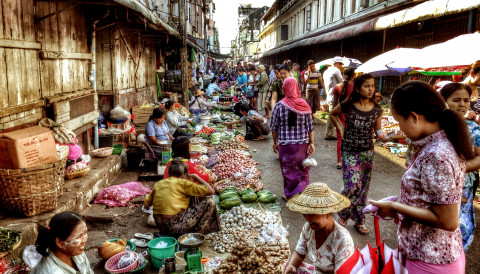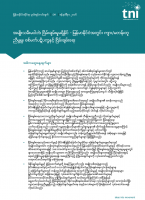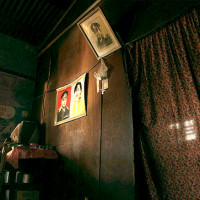ၿငိမ္းခ်မ္းေရးႏွင့္ အားလုံးပါဝင္ေရးအတြက္ လိုအပ္ခ်က္ လဖုိင္ဆုိင္းေရာ္၏ ေဝဖန္သုံးသပ္ခ်က္
Regions
ျမန္မာျပည္သူ/ျပည္သားမ်ားအေနျဖင့္ ႏုိင္ငံေရး၊ စီးပြားေရး၊ သာယာဝေျပာေရးႏွင့္ လူအခြင့္အေရးမ်ားဆုိင္ရာ အေရးႀကီးသည့္ကိစၥရပ္မ်ားကုိ အမ်ဳိးသားရင္ၾကားေစ့ေရးႏွင့္ ပူးေပါင္းလုပ္ေဆာင္လုိသည့္ စိတ္ဓါတ္ျဖင့္ အျပည့္အဝေဆြးေႏြးႏုိင္ေသာ အတူတကြ ေတြ႔ဆုံေဆြးေႏြးမႈႏွင့္ အားလုံးပါဝင္သည့္ ၿငိမ္းခ်မ္းေရးအတြက္ အခြင့္အလမ္းတစ္ခုကုိ ေတာင့္တေမွ်ာ္လင့္ေနခဲ့ၾကသည္မွာ ကာလၾကာျမင့္လွၿပီျဖစ္သည္။ ထုိ႔ေၾကာင့္ ၿငိမ္းခ်မ္းေရးႏွင့္ ေတြ႔ဆုံေဆြးေႏြးပြဲဆီသုိ႔ ဦးတည္သည့္ မည္သည့္လုပ္ေဆာင္ခ်က္ကုိမဆုိ အၿမဲႀကိဳဆုိလွ်က္ရွိသည္။

brentolson @ Flickr
ဤေဝဖန္သုံးသပ္ခ်က္သည္ ရန္ကုန္ၿမိဳ ႔တြင္က်င္းပသည့္ International Idea ၏ ကမၻာလုံးဆုိင္ရာ စီမံခ်က္တစ္ခုျဖစ္သည့္ “''ဒီမိုကေရစီအသြင္ကူးေျပာင္းျခင္းမ်ား (ကမၻာ့ေခါင္းေဆာင္မ်ားထံမွ သင္ယူ ျခင္း)''စာအုပ္မိတ္ဆက္ပြဲတြင္ လဖုိင္ဆုိင္းေရာ္၏ ေဆြးေႏြးတင္ျပခ်က္ကုိ အေျခခံေရးသားထားျခင္း ျဖစ္သည္။
လက္ရွိအခ်ိန္သည္ ကြ်န္မတုိ႔ႏုိင္ငံအတြက္ သမုိင္းတစ္ဆစ္ခ်ဳိးသုိ႔ေရာက္ရွိေနခ်ိန္ျဖစ္ၿပီး ၿပီးခဲ့သည့္ႏုိဝင္ဘာ အေထြေထြေရြးေကာက္ပြဲတြင္ အမ်ဳိးသားဒီမုိကေရစီအဖြဲ႔ခ်ဳပ္၏ ေအာင္ပြဲေၾကာင့္ ၿငိမ္းခ်မ္းေရးႏွင့္ အသြင္ ကူးေျပာင္းေရးတုိ႔အတြက္ ေမွ်ာ္လင့္အားတက္ခဲ့ရပါသည္။ တႏုိင္ငံလုံး ၿငိမ္းခ်မ္းေရးရရွိေရးအတြက္ စိန္ေခၚ မႈမ်ားကုိ တက္လာမည့္အစုိးရအေနျဖင့္ တာဝန္ယူရေတာ့မည္ျဖစ္ၿပီး ေမွ်ာ္လင့္ခ်က္မ်ားမွာလည္း ျမင့္မား လွ်က္ရွိသည္။ ၿငိမ္းခ်မ္းေရး လုပ္ငန္းစဥ္တစ္ခု ေအာင္ျမင္ေရးအတြက္ အတိတ္မွျဖစ္ရပ္မ်ားကုိ ျပန္လည္သုံးသပ္ၿပီး ဆယ္စုႏွစ္မ်ားစြာ ၿငိမ္းခ်မ္းေရးႏွင့္ ႏုိင္ငံကုိ ေရွ ႔မတက္ႏုိင္ေအာင္ ဆြဲခ်ခဲ့သည့္ စိတ္ပ်က္ဝမ္းနည္းဖြယ္ရာအမွားမ်ားမွ သင္ခန္းစာယူရန္မွာ အလြန္ပင္လုိအပ္လွပါသည္။ မေရမတြက္ႏုိင္ေသာလူေပါင္းမ်ားစြာ၏ အသက္၊အုိးအိမ္ စည္းစိမ္ဆုံး႐ႈံးမႈကုိ ျဖစ္ေစခဲ့ေသာက်႐ံႈးမႈ၏ ဝမ္းနည္းစရာ အတိတ္သမုိင္းပင္ျဖစ္သည္။
စိန္ေခၚမႈမ်ားစြာအနက္ အစုိးရအဆက္ဆက္လက္ထက္ အစဥ္အၿမဲအားနည္းခဲ့သည့္အခ်က္တစ္ခုမွာ တုိင္းရင္း သားလူမ်ဳိးေပါင္းစုံ၊ ႏုိင္ငံေရးပါတီေပါင္းစံုပါဝင္မႈႏွင့္ ကုိယ္စားျပဳမႈမရွိခဲ့ျခင္းပင္ျဖစ္သည္။ လြတ္လပ္ေရး လုိခ်င္စိတ္ဆႏၵေစာၿပီး ၁၉၄၇ခုႏွစ္ ေဖေဖၚဝါရီလတြင္ ပင္လုံညီလာခံကုိ တုိင္းရင္းသားလူမ်ဳိးစုံပါဝင္မႈမရွိ ေသးဘဲ က်င္းပခဲ့ျခင္း၏အက်ဳိးဆက္မွာ ဖြဲ႔စည္းပုံအေျခခံ ဥပေဒသစ္ေရးဆြဲအတည္ျပဳမည့္ တုိင္းျပဳျပည္ျပဳ လႊတ္ေတာ္အတြက္ ေရြးေကာက္ပြဲတြင္ ႏုိင္ငံေရးပါတီတုိင္း မပါဝင္ႏုိင္ေတာ့ျခင္းပင္ျဖစ္သည္။ ဤသုိ႔ျဖင့္ အလြန္အေရးႀကီးလွသည့္ ႏုိင္ငံေရးႏွင့္ လူမ်ဳိးစုျပႆနာမ်ားကုိ မေျဖရွင္းႏုိင္ခဲ့ဘဲ လြတ္လပ္ေရးရခဲ့ၿပီး အသစ္ ဖြဲ႔စည္းခဲ့ေသာ " ျပည္ေထာင္စုျမန္မာႏုိင္ငံ " ျဖစ္လာခဲ့ပါသည္။ တစ္ႏွစ္အတြင္းတြင္ ႏုိင္ငံတဝွမ္းလုံး မတည္ ၿငိမ္မႈႏွင့္ စစ္ပြဲမ်ား ျဖစ္ပြားခဲ့ၿပီး ယခုအခ်ိန္အထိပင္ ေျဖရွင္းႏုိင္ခဲ့ျခင္းမရွိေသးေခ်။
အလားတူ အားလုံးပါဝင္မႈမရွိျခင္းမ်ဳိးက " ျမန္မာ့နည္း ျမန္မာ့ဟန္ဒီမုိကေရစီစနစ္ " ၏ ရာစုႏွစ္ေလးပုံတစ္ပုံခန္႔ကာလအတြင္းတြင္လည္း ေတြ႔ခဲ့ရပါသည္။ ၁၉၆၃-၆၄ ခုႏွစ္အတြင္း ရလဒ္တစုံတရာမရွိခဲ့သည့္ ၿငိမ္းခ်မ္းေရး ေဆြးေႏြးပြဲျပဳလုပ္ခဲ့ၿပီးေနာက္ ဖြဲ႔စည္းအုပ္ခ်ဳပ္ပုံအေျခခံဥပေဒသစ္ကုိ ၁၉၇၄ ခုႏွစ္တြင္ အတင္းျပ႒ာန္းခဲ့ျပန္ပါသည္။ ယခုတစ္ႀကိမ္ႏုိင္ငံေရးစနစ္သစ္တစ္ခုျဖစ္ေသာတစ္ပါတီႏုိင္ငံေရးစနစ္ကလည္း တုိင္းရင္းသား လူမ်ဳိး ေပါင္းစုံအတြက္ ႏုိင္ငံေရးကုိယ္စားျပဳမႈႏွင့္ ဒီမုိကေရစီအခြင့္အေရးဆုိင္ရာ အေျခခံေတာင္းဆုိခ်က္မ်ား အတြက္ ေက်နပ္ေလာက္စရာအေျဖမေပးႏုိင္ခဲ့ျပန္ေခ်။
တုိင္းရင္းသားလူမ်ဳိးစုအခ်ဳိ ႔၏ပါဝင္ခြင့္ကုိကန္႔သတ္ထားၿပီး အဖြဲ႔အစည္းအခ်ဳိ ႔ကုိ ခြဲယူစည္း႐ုံးတတ္သည့္ အက်င့္ကုိ တပ္မေတာ္၏ ႏုိင္ငံေတာ္ ၿငိမ္ဝပ္ပိျပားမႈ တည္ေဆာက္ေရးအဖြဲ႔ ( ေနာင္တြင္ ႏုိင္ငံေတာ္ ေအးခ်မ္း သာယာေရးႏွင့္ဖြံ႔ၿဖိဳးေရးအဖြဲ႔ဟု ေျပာင္းလဲေခၚေဝၚခဲ့သည္) ေခတ္တုိ႔တြင္လည္း ဆက္လက္က်င့္သုံးခဲ့ၾက သည္။ ဤကာလအတြင္း အခ်ဳိ ႔ေနရာမ်ားတြင္ ၁၉၉၀ အေထြေထြေရြးေကာက္ပြဲႏွင့္ တုိင္းရင္းသား လူမ်ဳိးစုမ်ားႏွင့္ အပစ္အခတ္ရပ္စဲမႈတုိ႔ရွိခဲ့ေသာ္လည္း ဖြဲ႔စည္းအုပ္ခ်ဳပ္ပုံ အေျခခံဥပေဒေရးဆြဲရန္အတြက္ က်င္းပသည့္ အမ်ဳိးသားညီလာခံတြင္ တုိင္းရင္းသားလူမ်ဳိးေပါင္းစုံႏွင့္ ႏုိင္ငံေရးပါတီအားလုံး မပါဝင္ႏုိင္ခဲ့ေခ်။ ႏုိင္ငံ၏ ဖြ႔ံၿဖိဳးတုိးတက္မႈ ကုိ ေနာက္ဆယ္စုႏွစ္ႏွစ္ခုမွ်ေလာက္ အေႏွာက္အယွက္အဟန္႔အတားျဖစ္ေစခဲ့ၿပီး ပါတီအခ်ဳိ ႔ ႏွင့္ ႏုိင္ငံေရးသမားအခ်ဳိ ႔ကုိ “ကန္႔”ထားသည့္ ပုံစံကုိသာ ဆက္လက္က်င့္သုံးခဲ့ျပန္သျဖင့္ ၂၀၁၀ခုႏွစ္ ေရြးေကာက္ပြဲ ရလဒ္သည္လည္း လူအားလုံး၊ ႏုိင္ငံေရးပါတီအားလုံးႏွင့္ ေမွ်ာ္လင့္ရည္မွန္းခ်က္မ်ားအားလုံးကုိ ကုိယ္စား မျပဳသည့္ ရလဒ္ တစ္ခုသာလွ်င္ရွိခဲ႔ပါသည္။
ဆယ္စုႏွစ္မ်ားစြာ ကန္႔ထား၊ ဖယ္ထားမႈမ်ား၏ စုေပါင္းအက်ဳိးရလဒ္မွာ ၁၉၄၈ခုႏွစ္ လြတ္လပ္ေရး ကာလမွစ၍ ျပည္တြင္းမၿငိမ္သက္မႈႏွင့္ ႏုိင္ငံယုိယြင္းပ်က္စီးမႈအေမြတစ္ခုပင္ျဖစ္သည္။ အလြန္ရွင္းလင္းသည့္ သင္ခန္းစာ တစ္ခုမွာ ႏုိင္ငံ၏ မည္သည့္ျပဳျပင္ေျပာင္းလဲမႈ လုပ္ငန္းစဥ္တြင္မဆုိ စစ္မွန္သည့္ ၿငိမ္းခ်မ္းေရးႏွင့္တရားမွ်တမႈကုိ ရရွိေအာင္ျမင္လုိလွ်င္ ႏုိင္ငံေရးေဆြးေႏြးပြဲတြင္ တုိင္းရင္းသားလူမ်ဳိးေပါင္းစုံႏွင့္ ႏုိင္ငံ၏ေဒသေပါင္းစုံကုိ ထည့္သြင္းရန္ပင္ျဖစ္သည္။
၂၀၁၁ခုႏွစ္ သမၼတႀကီးဦးသိန္းစိန္ အစုိးရတက္လာခဲ့သည့္ ေနာက္ပိုင္းတြင္ ႏုိင္ငံေရးအခင္းအက်င္း တြင္ ပုံစံသစ္တခုသုိ႔ေျပာင္းခဲ့သည္။ ျပႆနာမ်ား၏ဇစ္ျမစ္မ်ားကုိ ကုိင္တြယ္ႏုိင္ရန္ ႏုိင္ငံေရးအေျဖရွာျခင္း နည္းလမ္း မ်ားမွတဆင့္ ပဋိပကၡကုိ ဘက္ေပါင္းစုံမွ ေျဖရွင္းရန္လုိအပ္ေၾကာင္း ကုိ သေဘာေပါက္လက္ခံၿပီး ပုိ၍ ပြင့္လင္းမႈမ်ားရွိလာသည္ကုိ သံသယျဖစ္စရာမရွိခဲ့ေခ်။ မွန္ကန္သည့္ လမ္းေၾကာင္းေပၚသုိ႔ ေရာက္ရွိရန္ အေရးႀကီးသည့္ ေျခလွမ္းမ်ား ပင္ျဖစ္သည္။ ျပဳျပင္ေျပာင္းလဲမႈအတြက္ ေမွ်ာ္လင့္ခ်က္မ်ားႏွင့္ အပစ္အခတ္ရပ္စဲေရးမ်ား ႏုိင္ငံ၏ အခ်ဳိ ႔ေနရာမ်ား တြင္ရွိလာခဲ့ေသာ္လည္း အခ်ဳိ ႔ေဒသမ်ား အထူးသျဖင့္ ျမန္မာႏုိင္ငံ၏အေရွ ႔ေျမာက္ပုိင္းေဒသမ်ားတြင္မူ တုိက္ပြဲမ်ားျပန္လည္ျဖစ္ပြားခဲ့ၿပီး ပုိ၍ပင္ျပင္းထန္ခဲ့ပါသည္။
စစ္မက္ပဋိပကၡမ်ား၊ စစ္ေဘးေရွာင္ေနရမႈ၊ လူ႔အခြင့္အေရးခ်ဳိးေဖါက္ခံရမႈ၊ အသက္ဆုံး႐ႈံးမႈမ်ားသည္ ယေန႔ ထက္ထိတုိင္ေအာင္ ႏုိင္ငံတြင္ဆက္လက္ရွိေနခဲ့သည္။ လက္ရွိအစုိးရလက္ထက္တြင္ ၿငိမ္းခ်မ္းေရးလုပ္ငန္းစဥ္ အတြက္ အစည္းအေဝးမ်ားတြင္ ယင္းပဋိပကၡျဖစ္ေနသည့္ေနရာမ်ားမွ အဖြဲ႔မ်ားကုိယ္စားျပဳပါဝင္ႏုိင္ျခင္း မရွိေသးသည့္အခ်က္မွာလည္း ဝမ္းနည္းစရာျဖစ္သည္။ ပဋိပကၡျဖစ္ေနသည့္ေနရာမ်ားမွ အဖြဲ႔မ်ား၏ ကုိယ္စားျပဳ မႈမရွိသည့္ မည္သည့္ ေဆြးေႏြးပြဲမ်ဳိးကုိမဆုိ အားလုံးပါဝင္သည့္ပြဲဟု မသတ္မွတ္ႏုိင္ေခ်။ အမွန္တြင္ “တႏုိင္ငံ လုံးအတြက္” အေျဖတစ္ခုအျဖစ္ျဖင့္ ေျပာဆုိေနၾကသည့္ တပုိင္းတစသေဘာတူစာခ်ဳပ္သည္ အလြန္ပင္ အႏၱရာယ္ႀကီးလွၿပီး ပဋိပကၡကုိ အဓြန္႔ရွည္ေစႏုိင္သည့္ ရလဒ္မ်ဳိးသာျဖစ္ေစႏုိင္ပါသည္။ ႏွစ္ေပါင္းမ်ားစြာ ဒုကၡမ်ားခံစားလာခဲ့ၾကရၿပီးေနာက္ စစ္မွန္သည့္ ၿငိမ္းခ်မ္းေရးႏွင့္ ျပဳျပင္ေျပာင္းလဲေရးအတြက္ အားလုံး ၏အသံမ်ားကုိ နားေထာင္ရန္လုိအပ္ၿပီး အဖြဲ႔အစည္းအားလုံးကုိ ပါဝင္ခြင့္ေပးရမည္ဆုိသည္ကုိ ႏုိင္ငံသား မ်ားအေနျဖင့္ နားလည္သေဘာေပါက္လက္ခံထားၾကပါသည္။
တခ်ိန္တည္းမွာပင္ ၿငိမ္းခ်မ္းေရးေဆြးေႏြးပြဲမ်ားအား ခုိင္မာသည့္ အျပန္အလွန္နားလည္မႈ တည္ေဆာက္ျခင္းႏွင့္ ပဋိပကၡေျဖရွင္းရန္ႏွင့္ ႏုိင္ငံေရးအေျပာင္းအလဲျဖစ္ေစရန္ ႏုိင္ငံေတာ္အဆင့္ အေလးထားမႈမ်ား ဆက္လက္ထားရွိျခင္း ရည္ရြယ္ခ်က္ျဖင့္ ဆက္လက္လုပ္ေဆာင္သြားရန္လည္း အေရးႀကီးပါသည္။ သုိ႔ေသာ္လက္ရွိ လုပ္ေဆာင္ေနသည္မ်ားကုိ ပဏာမ ေဆြးေႏြးပြဲမ်ားအျဖစ္ နားလည္သေဘာေပါက္ထားရမည္ျဖစ္ၿပီး - လာမည့္ လႊတ္ေတာ္သက္တမ္းအတြင္း ျဖစ္လာမည္ဟုေမွ်ာ္လင့္ထားသည့္ အားလုံးပါဝင္သည့္ ႏုိင္ငံေရး ေဆြးေႏြးပြဲႏွင့္ ျပဳျပင္ေျပာင္းလဲမႈ အေကာင္အထည္ေဖၚျခင္းသုိ႔ ဦးတည္သြားႏုိင္ရန္သာလွ်င္ သေဘာေပါက္ ထားရမည္။
ဤေနရာတြင္ လႊတ္ေတာ္တြင္းႏွင့္ ၿငိမ္းခ်မ္းေရးေဆြးေႏြးမႈလုပ္ငန္းစဥ္မ်ားမွတဆင့္ ႏုိင္ငံအေျပာင္းအလဲ၏ လက္ရွိအေျခအေနအခင္းအက်င္းက အေတြးအေခၚအယူအဆမတူသူမ်ားႏွင့္ ဘုံတူညီခ်က္မ်ား ရွာေဖြရင္း ရည္မွန္းခ်က္ပန္းတုိင္တူညီသူမ်ားႏွင့္ အေတြးအေခၚအယူအဆမ်ား ဖလွယ္ရန္အခြင့္အလမ္းမ်ားကုိ ဖန္တီးေပးထားပါသည္။ တစ္ဦးခ်င္းစီ၏ သေဘာထားအျမင္မ်ား မည္သုိ႔ရွိေစကာမူ ႏုိင္ငံအတြက္ အတူ ေရွ ႔ဆက္ လွမ္းႏုိင္ရန္ ရႈေထာင့္အျမင္မ်ားကုိ စုစည္းၿပီး လုပ္ေဆာင္ရမည့္ လုပ္ငန္းစဥ္မ်ားကုိ အတူခ်မွတ္ ၾကရန္လုိအပ္ပါသည္။ ေဆြးေႏြးပြဲအသီးသီးတြင္ ပါဝင္ေနသူအားလုံးအေနျဖင့္ လက္ရွိျဖစ္ေပၚေနသည့္ အသြင္ကူးေျပာင္းသည့္လုပ္ငန္းစဥ္မ်ား၏ တစ္ခုတည္းေသာ ရလဒ္မွာ အားလုံးပါဝင္မႈ၊ ႏုိင္ငံေရးေဆြးေႏြးပြဲႏွင့္ စစ္မွန္သည့္ျပဳျပင္ေျပာင္းလဲမႈမ်ားသာ ျဖစ္ရမည္ဆုိသည့္အခ်က္ကုိ အႄကြင္းမဲ့ယုံၾကည္ေနရမည္။
မၾကာေသးမီလမ်ားအတြင္းက အမ်ဳိးသားႏုိင္ငံေရးတြင္ တုိင္းရင္းသားအုပ္စုမ်ဳိးစုံအၾကား အခ်ဳိ ႔ကုိ “ဖယ္”ထား ျခင္းႏွင့္ “ပယ္”ထားျခင္းက အခ်ဳိ ႔အုပ္စုမ်ားကုိ လူေပါင္းစုံ ပါဝင္သည့္ အေရးႀကီးသည့္ သေဘာတူညီခ်က္သုိ႔ မေရာက္ရွိႏုိင္မီ ကုိယ္က်ဳိးရွာရန္ ေရွ ႔တန္းတင္လာေစၿပီး တုိးတက္မႈကုိ ၿခိမ္းေျခာက္ေနမည္လားဟု စုိးရိမ္ ပူပန္မႈမ်ား ျမင့္တက္လာေစခဲ့သည္။ ထို႔ေၾကာင့္ မတူကြဲျပားၾကသည့္ ယဥ္ေက်းမႈႏွင့္ သမုိင္းမ်ားအတြက္ ေနရာတစ္ခုကုိ ဖန္တီးေပးၿပီး ႏုိင္ငံ၏စည္းလုံးညီညြတ္မႈရရွိေစရန္ ႏုိင္ငံေရးစနစ္သစ္တစ္ခုကုိ တည္ေထာင္ရန္ ကြဲျပားျခားနားမႈမ်ားကုိ ေပါင္းကူးဆက္စပ္ေပးၾကရမည္။ အမ်ဳိးသားအဆင့္ ယုံၾကည္မႈ တည္ေဆာက္ႏုိင္လွ်င္ အေျဖရွာရန္ ထင္သေလာက္ခက္ခဲလိမ့္မည္မဟုတ္ဟု ယုံၾကည္မိပါသည္။ ႏွစ္ေပါင္းမ်ားစြာ ေစာင့္ဆုိင္းေန ခဲ့ၾကရသည့္ လူမ်ဳိးေပါင္းစုံႏွင့္ ႏုိင္ငံေရးပါတီေပါင္းစုံ အတူတကြ ေတြ႔ဆုံႏုိင္သည့္ အခြင့္အလမ္းမရရွိသည့္အတြက္ အတိတ္မွက်ရႈံးမႈမ်ားျဖစ္ခဲ့သည္ကုိ ေနာက္ေယာင္ခံၾကည့္ႏုိင္ပါသည္။ ႏုိင္ငံေရး ေခတ္သစ္တြင္ “ဖယ္”ထားျခင္းႏွင့္ “ပယ္”ထားျခင္းမ်ားကုိ ေနာက္ဆုံးတြင္ ေက်ာ္လႊားႏုိင္ၾကရမည္။
ႏိုင္ငံသားတုိ႔၏စိတ္ခံစားမႈကုိ ေရာင္ျပန္ဟပ္ခဲ့သည့္ အေထြေထြေရြးေကာက္ပြဲတြင္ အမ်ဳိးသား ဒီမုိကေရစီ အဖြဲ႔ခ်ဳပ္၏ေအာင္ပြဲသည္ ျမန္မာတႏုိင္ငံလုံးရွိ တုိင္းရင္းသားလူမ်ဳိးေပါင္းစုံ၏ အေျပာင္းအလဲကုိ မည္မွ် လုိလားေနသည္ဆုိသည္ကုိ သက္ေသျပလုိက္ျခင္းပင္ျဖစ္သည္။ ၿငိမ္းခ်မ္းေရးႏွင့္ ျပဳျပင္ေျပာင္းလဲေရးအတြက္ ေပးခဲ့သည့္မဲမ်ားျဖစ္ၿပီး အစုိးရသစ္အေနျဖင့္ တႏုိင္ငံ လုံး ျပန္လည္ရင္ၾကားေစ့ေရးႏွင့္ ျပဳျဳပင္ေျပာင္းလဲေရး ေအာင္ျမင္စြာလုပ္ေဆာင္ႏုိင္ရန္အတြက္ အားလုံးပါဝင္သည့္ လုပ္ငန္းစဥ္တစ္ခုစတင္ရန္ ခုိင္မာသည့္ လုပ္ပုိင္ခြင့္အာဏာ ရရွိခဲ့ပါသည္။
ႏုိင္ငံတြင္းရွိ တိုင္းရင္းသားလူမ်ိဳးအားလုံးသည္ ၿငိမ္းခ်မ္းေရးကုိေတာင့္တေနၾကပါသည္။ ကြ်န္မတုိ႔၏ ရင္ေသြး လူငယ္မ်ားကုိ ႏုိင္ငံသားအခ်င္းခ်င္း သတ္ျဖတ္ရန္ ေရွ ႔တန္းသုိ႔မေစလႊတ္လုိပါ။ ကြ်န္မတုိ႔အေနျဖင့္ လက္နက္ဝယ္ရန္ ရင္းႏွီးျမဳပ္ႏံွမႈ မျပဳလုပ္လုိပါ။ ယင္းသုိ႔ဝယ္မည့္အစား ကြ်န္မတုိ႔ အရင္းအျမစ္မ်ားကုိ အသုံးျပဳၿပီး ရြာငယ္ ဇနပုဒ္မွ ၿမိဳ ႔ႀကီးျပႀကီးအထိ တႏုိင္ငံလုံးတြင္ စာသင္ေက်ာင္းမ်ားေဆာက္လုပ္လုိပါသည္။ လက္နက္ခဲယမ္း မီး ေက်ာက္မ်ား ဝယ္မည့္အစား ေခတ္မီသည့္ က်န္းမာေရးဝန္ေဆာင္မႈမ်ားအတြက္ အသုံးျပဳလုိပါသည္။ သုိ႔ေသာ္ ထုိသုိ႔ျပဳလုပ္ႏုိင္ရန္ ေသနတ္သံမ်ားခ်ဳပ္ၿငိမ္းရမည္။ ျပည္တြင္းစစ္မွန္သမွ် ရပ္ပစ္ရပါမည္။ ရာစုႏွစ္ဝက္ေက်ာ္ ၾကာခဲ့ၿပီျဖစ္သည့္ တုိက္ပြဲမ်ားတြင္ ေအာင္ပြဲခံသူမရွိခဲ့ေခ်။ လူ႔ဂုဏ္သိကၡာ၊ အသက္အုိးအိမ္စည္းစိမ္ဆုံး႐ႈံး မႈႏွင့္ " ႏုိင္ငံမြဲျပာက်မႈ " မ်ားသာရွိခဲ့ၾကပါသည္။
ထုိ႔ေၾကာင့္ အမ်ဳိးသားဒီမုိကေရစီအဖြဲ႔ခ်ဳပ္ဥကၠ႒ ေဒၚေအာင္ဆန္းစုၾကည္က အဖြဲ႔ခ်ဳပ္အစုိးရတက္လာလွ်င္ ၿငိမ္း ခ်မ္းေရးကုိ ဦးစားေပးလုပ္ေဆာင္မည္ဟုေျပာခဲ့သည္ကုိ ဝမ္းေျမာက္စြာႀကိဳဆုိမိပါသည္။ ႏုိင္ငံသားမ်ား အေန ျဖင့္ မိမိတုိ႔၏ အိပ္မက္ျဖစ္သည့္ မေတာင့္မတမေၾကာင့္မၾကေနႏုိင္ေရး၊ က်န္းမာေရးႏွင့္ ပညာေရးတုိ႔ျဖစ္လာ ေစရန္ ၿငိမ္းခ်မ္းေရးအုတ္ျမစ္ေပၚမွသာ တည္ေဆာက္ႏုိင္မည္ဟု ယုံၾကည္နားလည္ထားပါသည္။ အျပန္အလွန္အားျဖင့္ ထုိသုိ႔ေသာ ၿငိမ္းခ်မ္းေရးသည္ တုိင္းရင္းသားလူမ်ဳိးမ်ားအားလုံး၏ အခြင့္အေရးမ်ားကုိ ေလးစားတန္ဖုိးထားၿပီး တန္းတူအခြင့္အလမ္းမ်ားအတြက္ အာမခံခ်က္ေပးႏုိင္သည့္ ႏုိင္ငံေရးစနစ္ တစ္ခုျဖစ္ေသာ ဖက္ဒရယ္စနစ္ကုိ ဦးတည္ေစၿပီး အားလုံးပါဝင္သည့္ေဆြးေႏြးမႈတစ္ခုအေပၚတြင္ မူတည္ေန ပါသည္။ သုိ႔ေသာ္ ထုိကဲ့သုိ႔ေသာ ႏုိင္ငံေရးစနစ္တစ္ခုကုိ သေဘာတူညီၾကရာတြင္ တႏုိင္ငံလုံးၿငိမ္းခ်မ္းေရး ရရွိေစႏုိင္သည့္ ႏုိင္ငံေရးဆုိင္ရာ ေဆြးေႏြးပြဲကုိ မျဖစ္မေန လက္ေတြ႔လုပ္ေဆာင္ရန္လည္း လုိအပ္ပါသည္။ အထူးသျဖင့္ စစ္တပ္မွ စစ္ဆင္ေရးမ်ားကုိ ရပ္တန္းမွရပ္ရပါမည္။ လူ႔အခြင့္အေရးမ်ားကုိ ေလးစားလုိက္နာ ရပါမည္။ ေျမယာသိမ္းမႈႏွင့္ စီးပြားေရးဂုတ္ေသြးစုတ္မႈမ်ားကုိ ရပ္တန္းမွရပ္ရန္လုိအပ္ပါသည္။ အဖြဲ႔အစည္း တုိင္းမွ တစ္ဖြဲ႔ႏွင့္တစ္ဖြဲ႔အျပန္အလွန္ေလးစားမႈ၊ စိတ္ေစတနာအမွန္ျဖင့္ တစ္ျပည္လုံး၏ ၿငိမ္းခ်မ္းေရးႏွင့္ ႏုိင္ငံေရးျပဳျပင္ေျပာင္းလဲမႈအတြက္ လုပ္ငန္းစဥ္မ်ားတြင္ ပါဝင္ လုပ္ေဆာင္ၾကရပါမည္။
ဤသုိ႔ေသာ အေရးေပၚစိန္ေခၚမႈမ်ားက ေနာင္မ်ဳိးဆက္မ်ားအတြက္ ၿငိမ္းခ်မ္းေရးႏွင့္ ျပဳျပင္ေျပာင္းလဲမႈ အေမြအႏွစ္ကုိ ေပးႏုိင္သည့္အခြင့္အလမ္းမ်ားရွိလာသည့္ ႏုိင္ငံရွိ ေခါင္းေဆာင္မ်ားအားလုံးအေပၚ ႀကီးမားသည့္ တာဝန္တစ္ခုကုိ ပုံေပးလုိက္ပါသည္။ ဆုိလုိသည္မွာ လႊတ္ေတာ္ႏွင့္ၿငိမ္းခ်မ္းေရးေဆြးေႏြးမႈ လုပ္ငန္းစဥ္မ်ား တြင္ ပါဝင္ေနသူမ်ားက ယခင္ကအမွားမ်ားကုိ ထပ္၍မမွားေစရန္ အတိတ္မွ မွားယြင္းမႈမ်ားႏွင့္ လက္ရွိ လုိအပ္ခ်က္မ်ားကုိ ေသခ်ာစြာ နားလည္ သေဘာေပါက္သိရွိထားသင့္ပါသည္။ အထူးသျဖင့္ တက္လာမည့္ အစုိးရသစ္အတြက္ ႏုိင္ငံေရးအခင္းအက်င္းတြင္ ၿငိမ္းခ်မ္းေရးအတြက္ ႀကိဳးပမ္းမႈလုပ္ငန္းမ်ားသည္ အကြဲအၿပဲအသစ္မ်ားႏွင့္ '' သမိုင္းအမိႈက္သ႐ုိက္ '' မ်ား မေပးခဲ့ ရန္ ႏွင့္ အေရးႀကီးဆံုးဦးတည္ခ်က္ပန္းတုိင္သည္ ျပည္သူအားလံုးအတြက္ ၿငိမ္းခ်မ္းေရးႏွင့္ စည္းလံုးညီညြတ္ေရးသာ ျဖစ္သင့္ပါသည္။
ၿငိမ္းခ်မ္းေရးႏွင့္ ျပဳျပင္ေျပာင္းလဲေရးကုိ ေရွ ႔ဆက္လုပ္ေဆာင္ရာတြင္ လုိအပ္ခ်က္မ်ားကုိလည္း အေလးထား ေဖၚျပလုိပါသည္။ အေျခခံစိန္ေခၚမႈမ်ားစြာအနက္ အေရးႀကီးဆုံးမွာ စစ္တပ္ႏွင့္အရပ္ဖက္အဖြဲ႔အစည္းမ်ား အၾကား ဆက္ဆံေရးကုိျပန္လည္တည္ေဆာက္ေရး၊ အမ်ဳိးသားျပန္လည္ရင္ၾကားေစ့ေရး၊ ၿငိမ္းခ်မ္းေရး ႏွင့္ လူမႈေရးႏွင့္ စီးပြားေရးဖြံ႔ၿဖိဳးတုိးတက္မႈမ်ားကုိ လူတုိင္း ခံစား၊ စံစားရႏုိင္မည့္ အေရးမ်ားကုိ ဦးတည္မည့္ အားလုံး ပါဝင္ သည့္ ႏုိင္ငံေရးစကားဝုိင္းတစ္ခုေပၚေပါက္ေရးျဖစ္သည္။ “တႏုိင္ငံလုံးၿငိမ္းခ်မ္းေရး”လုပ္ငန္း စဥ္ဆုိသည့္ ေခါင္းစဥ္ေအာက္တြင္ စစ္ပြဲမ်က္ႏွာစာ၌ တုိင္ပင္ေဆြးေႏြးမႈမ်ားဆက္လက္ျပဳလုပ္လွ်က္ရွိပါသည္။ ကံအေၾကာင္းမလွစြာ ပင္ ျပည္သူလူထုအမ်ားစုအတြက္ ယင္းအသုံးအႏႈံးသည္မွားယြင္းစြာ နားလည္ သေဘာေပါက္ေစႏုိင္သည့္ စကားရပ္တစ္ခုဟု သေဘာထားမ်ဳိးရွိၾကသည္။ အမွန္ျဖစ္ေနသည့္ အေျခအေနမွာ ႏုိင္ငံအတြင္းရွိ တုိင္းရင္းသား အတုိက္အခံအုပ္စုမ်ား၏ တဝက္ပင္မရွိသည့္ အဖြဲ႔အနည္းငယ္ႏွင့္ တပုိင္းတစ အပစ္အခတ္ရပ္စဲေရးျပႆနာမ်ားႏွင့္ ေရွ ႔တုိးေနာက္ဆုတ္၍မရသည့္ “ၿငိမ္းခ်မ္းေရး လုပ္ငန္းစဥ္”တစ္ခုကုိ တုိင္းရင္းသား အဖြဲ႔အစည္းမ်ားစြာအေနျဖင့္ ရင္ဆုိင္ေနရသည့္အေျခအေနမ်ဳိးပင္ျဖစ္သည္။ တခ်ိန္တည္းမွာပင္ အားလုံးပါဝင္မႈမရွိျခင္းသည္ ေဆြးေႏြးပြဲမ်ားကုိ ဦးေဆာင္သူမ်ားေၾကာင့္ခ်ည္းသက္သက္မဟုတ္ဘဲ စစ္အုပ္ခ်ဳပ္မႈကုိ ဆန္႔က်င္ၾကသူမ်ား အၾကားတြင္လည္း တစ္ဖြဲ႔ ႏွင့္ တစ္ဖြဲ႔ အၾကား ညီညြတ္မႈမရွိၾကျခင္း ေၾကာင့္လည္း ျဖစ္ပါသည္။
မၾကာေသးမီလမ်ားအတြင္းက အေထြေထြေရြးေကာက္ပြဲတြင္ အမ်ဳိးသားဒီမုိကေရစီအဖြဲ႔ခ်ဳပ္၏ ေအာင္ပြဲ ေၾကာင့္ NLD ႏွင့္တစိတ္တည္းတဝမ္းတည္းျဖင့္ တုိင္းရင္းသားလူမ်ဳိးစုအဖြဲ႔အမ်ဳိးမ်ဳိးအၾကား ၿငိမ္းခ်မ္းေရးကုိ ဦးစားေပး လုပ္ေဆာင္ရန္ ေတာင္းဆုိမႈတြင္ ပုိ၍ ညီညြတ္သေဘာတူညီမႈရွိလာခဲ့ၾကပါသည္။ ပဋိပကၡခ်ဳပ္ျငိမ္းရန္ အတြက္ အမ်ဳိးသားအဆင့္ၿငိမ္းခ်မ္းေရးေရွ ႔ဆက္ႏုိင္ေစရန္ ေအာက္ပါအဓိကအခ်က္ (၆)ခ်က္သည္ အေရး ႀကီးဆံုး ျဖစ္ပါသည္။
အပစ္အခတ္ရပ္စဲေရးႏွင့္ စစ္အသြင္ပေပ်ာက္ေရး demilitarisation ကုိ စဥ္ဆက္မျပတ္ေစာင့္ၾကည့္ ျခင္း
စစ္ေဘးေရွာင္ ဒုကၡသည္မ်ားကို မိမိတုိ႔ဆႏၵအေလွ်ာက္ေနရပ္သို႔ျပန္ေစျခင္း (သုိ႔မဟုတ္) ျပန္လည္ေနရာခ် ထားေပးျခင္း
အားလံုးပါဝင္သည့္ႏိုင္ငံေရးေဆြးေႏြးမႈႏွင့္ အေျခခံဥပေဒျပင္ဆင္ေရး
အရပ္ဖက္- စစ္ဖက္ဆက္ဆံေရးကုိ ရင္ၾကားေစ့မူ၀ါဒႏွင့္ျပန္လည္တည္ေဆာက္ေရး (ကလဲ့စားမေခ်ေရး)
လူတိုင္း လူတိုင္းအတြက္ သာတူညီမွ် အခြင့္အေရး
သဘာ၀ ပတ္၀န္းက်င္အရင္းအျမစ္မ်ားကုိ ( ေဒသခံျပည္သူလူထုကို ဦးစားေပး၍) တိုင္းျပည္ဖြံ႔ၿဖိဳးတိုးတက္ေရး အတြက္ခြဲေ၀သံုးစြဲေရး။
ယင္းလုိအပ္ခ်က္မ်ားမွေပၚထြက္လာသည့္ လက္ငင္းေမးျမန္းရမည့္ေမးခြန္းမ်ားအနက္တစ္ခုမွာ ႏုိင္ငံ ေျပာင္းလဲ ေရးအတြက္ NLD ကုိ ရွင္းလင္း ျပတ္သားသည့္လုပ္ပုိင္ခြင့္အာဏာေပးခဲ့ေသာ ႏုိင္ငံသားမ်ားသည္တုိင္းျပည္၏ စီးပြားေရးႏွင့္ ႏုိင္ငံေရးလားရာလမ္းမ်ားကုိ ခ်ဳပ္ကုိင္ထားႏုိင္ရန္ အာဏာကုိ ဆက္လက္ဆုပ္ကုိင္ထားျခင္းသည္ ဖက္ဒရယ္စနစ္၏မူေဘာင္အတြင္းတြင္ ဒီမုိကေရစီနည္းက် တန္းတူအခြင့္အေရးမ်ားရရွိပုိင္ဆုိင္ခြင့္မ်ားအတြက္ ႀကိဳးပမ္းေနသည့္ တုိင္းရင္းသားမ်ားျဖင့္ အာဏာခြဲေဝယူျခင္းထက္ ႏုိင္ငံတည္ၿငိမ္မႈကုိ ေရရွည္တြင္ ၿခိမ္းေျခာက္ လာႏုိင္သည္ဆိုသည္ကုိ စစ္တပ္အာဏာပုိင္မ်ား ယုံၾကည္လာေအာင္ မည္သုိ႔လုပ္ေဆာင္မည္ဆုိသည့္ အခ်က္ပင္ျဖစ္သည္။ယင္းသုိ႔ျဖစ္လာေစရန္ စစ္အရာရွိမ်ားအား သူတို႔အတြက္သာမက သူတို႔၏သားသမီး ေျမးျမစ္မ်ား အတြက္ပါ ေခတ္မီဖြ႔ံျဖိဳးသည့္ႏိုင္ငံတြင္ တိုင္းရင္းသားေပါင္းစံုႏွင့္ အတူတကြရပ္တည္ႏိုင္ျခင္းသည္ ဆင္းရဲ သည့္ႏိုင္ငံတြင္ အိမ္နီးခ်င္းမ်ားက ေခါင္းပုံျဖတ္ခံေနရၿပီး မိမိလူမ်ဳိးမ်ားကုိ ေခါင္းပုံျဖတ္၍ အခြင့္ထူးခံရျခင္းထက္ ပုိေကာင္းသည္ဟု နားလည္လက္ခံေစရပါမည္။
ယင္းျပႆနာမ်ားကုိ ေျဖရွင္းရန္ ေဒၚေအာင္ဆန္းစုၾကည္ကုိယ္တုိင္ကလည္း အမ်ဳိးသားရင္ၾကားေစ့ေရးကုိ ဦးတည္သည့္အစုိးရဖြဲ႔မည္ဟု ေျပာခဲ့ၿပီးျဖစ္သည္။ ထုိ႔ေၾကာင့္လာမယ့္လမ်ားတြင္ တန္ဖုိးရွိလွသည့္အခ်ိန္မ်ားအား တစ္ေယာက္ ႏွင့္ တစ္ေယာက္ လက္ညဳိးထိုးစြပ္စြဲျခင္း၊ ကလဲ့စားေခ်ျခင္းမ်ားႏွင့္ အခ်ိန္ကုန္ၾကမည့္အစား အျပဳသေဘာေဆာင္သည့္စိတ္ႏွင့္ႀကိဳဆိုရမည္ျဖစ္ပါသည္။ ေဒၚစုအျမဲတမ္း အေလးအနက္ထားေျပာဆို လုပ္ေဆာင္ေနသည့္ ''တရားဥပေဒ စိုးမိုးေရး''က ႏိုင္ငံသားတိုင္းကုိ အကာအကြယ္ေပးပါလိမ့္မည္။ အရပ္ဖက္ အက်ိဳးစီးပြားႏွင့္ စစ္ဖက္ အက်ိဳးစီးပြားကုိ မွ်တေအာင္ ေဆာင္ရြက္ရာတြင္ NLD ပါတီ၏ ၿငိမ္းခ်မ္းေရးႏွင့္ ျပဳျပင္ ေျပာင္းလဲေရး အစီအစဥ္ႏွင့္ဟန္ခ်က္ညီညီ လုပ္ေဆာင္သြားႏိုင္မည္ဟု ေမွ်ာ္လင့္ပါသည္။ အကဲဆတ္သည့္ လုပ္ငန္းတစ္ခုလည္း ျဖစ္ႏုိင္ပါသည္။
ေရရွည္အတြက္ အနာဂတ္ကုိေမွ်ာ္ၾကည့္ၿပီး ဒီမုိကေရစီနည္းက်ေသာ ဖက္ဒရယ္လူ႔အဖြဲ႔အစည္းတစ္ခုသုိ႔ ႏုိင္ငံေရးအသြင္ကူးေျပာင္းရာတြင္ မိသားစုမ်ားစြာသည္ အလြန္ဆင္းရဲမြဲေတေနေသးသည့္ အေျခအေန တြင္ ေနထုိင္ေနၾက ရေသးသည့္အတြက္ ႏုိင္ငံစီးပြားေရးတြင္လည္း ျမင္သာထင္သာစြာ တုိးတက္ေအာင္ ေဆာင္ ၾကဥ္းႏုိင္ရမည္။ ျမန္မာႏုိင္ငံသည္ သဘာဝသယံဇာတ အရင္းအျမစ္ႄကြယ္ဝၿပီး အလားအလာေကာင္းမ်ားစြာလည္းရွိသည့္ ႏုိင္ငံတစ္ႏုိင္ငံျဖစ္သည္။ သုိ႔ေသာ္ အရင္းအျမစ္မ်ားထုတ္ယူသည့္ က႑မ်ားတြင္ ထိမ္ခ်န္ ထားသည့္ ေငြပမာဏမ်ားစြာသည္ အရာရွိႀကီးမ်ားႏွင့္ သူတုိ႔ႏွင့္ပတ္သက္သည့္ စီးပြားဘက္မ်ား၏ ဘဏ္စာရင္းမ်ားထဲသုိ႔ သာ ေရာက္ရွိခဲ့သည္မွာ ႏွစ္ေပါင္းမ်ားစြာရွိခဲ့ၿပီ္။ ထုိ႔အျပင္ အခြန္အခေကာက္ယူသည့္ပမာဏအနည္းငယ္မွ ရရွိသည့္ ဘ႑ာေငြေၾကးမ်ားမွာလည္း တုိင္းရင္းသားလူထုမ်ား၏ ေျမယာမ်ားမွ အမွန္တကယ္ထုတ္ယူသည့္ အရင္းအျမစ္မ်ား အတြက္ အမွန္တကယ္ထုိက္တန္သည့္ တန္ဖုိးႏွင့္လည္း မညီမွ်ခဲ့ေခ်။
ဝမ္းနည္းစိတ္ပ်က္ဖြယ္ေကာင္းစြာပင္ ျမန္မာႏုိင္ငံ၏ လိပ္ခဲတည္းလည္းအေျခအေနတြင္ ယင္းသယံဇာတ အရင္းအျမစ္မ်ားကုိ ခုိးထုတ္ျခင္း၊ ေရာင္းစားျခင္းျဖင့္ သယံဇာတ အရင္းအျမစ္မ်ားမွာ ထာဝရ ေပ်ာက္ကြယ္လွ်က္ရွိပါ သည္။ ႏုိင္ငံတစ္ႏုိင္ငံအတြက္သာမက ယင္းသယံဇာတမ်ား ထြက္ရွိသည့္ တုိင္းရင္းသား ျပည္နယ္မ်ား အတြက္လည္း မည္သည့္အက်ဳိးအျမတ္မွမရရွိခဲ့႐ုံမွ်မက ေျမယာဆုံး႐ႈံးမႈႏွင့္ အသက္ေမြးဝမ္းေက်ာင္း လုပ္ငန္းမ်ားေပ်ာက္ကြယ္မႈ၊ သဘာဝပတ္ဝန္းက်င္ပ်က္သုဥ္းမႈႏွင့္ က်န္းမာေရး အတြက္အႏၱရာယ္ရွိမႈမ်ားႏွင့္ပါ ရင္ဆုိင္ေနၾကရပါသည္။ ဥပမာအားျဖင့္ သံယဇာတအရင္းအျမစ္ၾကြယ္ဝသည့္ ႏုိင္ငံ(၅၈)ႏိုင္ငံကို ေလ့လာ ထားသည့္ Natural Resources Governance Institution မွထုတ္ျပန္ထားသည့္ Resource Governance Index အရ ယင္း(၅၈)ႏိုင္ငံတြင္ ေပးမွတ္ (၁၀၀)အနက္(၄)မွတ္သာရရွိၿပီး ျမန္မာျပည္သည္ ေအာက္ဆံုး အဆင့္သုိ႔ ေရာက္ရွိေနပါသည္။ ကြ်န္မတုိ႔၏လူငယ္မ်ားအတြက္ ဆုိးရြားလွသည့္ သမုိင္းအေမြကုိ ထားခဲ့ပါသည္။
အျပဳသေဘာေဆာင္သည့္အခ်က္တစ္ခုမွာ အာဏာလႊဲေျပာင္းေပးရေတာ့မည့္အစုိးရသည္ သဘာဝ အရင္း အျမစ္မ်ားကုိ ပြင့္လင္းျမင္သာၿပီး တာဝန္ခံမႈရွိသည့္ စီမံခန္႔ခြဲမႈကုိ တုိက္တြန္းအားေပးသည့္ ကမၻာ့အဆင့္မီ စံႏႈန္းမ်ားျဖင့္လုပ္ကုိင္ေနသည့္ သဘာဝအရင္းအျမစ္မ်ားထုတ္ယူသည့္လုပ္ငန္းမ်ားတြင္ ပြင့္လင္းျမင္သာမႈ ရွိေစေရးလုပ္ငန္း (Extractive Industries Transparency Initiative) တြင္ ပါဝင္ရန္ စီစဥ္ေနသည္ကုိ အသိအမွတ္ျပဳေပးရန္ အေရးႀကီးပါသည္။ သုိ႔ရာတြင္ ထုိသုိ႔ပါ၀င္ျခင္းသည့္ ကၽြန္မတို႔၏ သယံဇာတ အရင္း အျမစ္မ်ားအား ေဒသခံျပည္သူလူထု အက်ိဳးရွိေစရန္ စည္းကမ္းတက်ထုတ္ယူေစရန္အတြက္ ပထမေျခလွမ္း မွ် ဟုသာမွတ္ယူရမည္ျဖစ္ပါသည္။
ယခုအခ်ိန္သည္ အေရးႀကီးသည့္အခ်ိန္ပင္ျဖစ္သည္။ လူထုအၾကားတြင္မူ အတိတ္မွ ႏုိင္ငံေရးႏွင့္စီးပြားေရး ဆုိင္ရာအမွားမ်ားကုိ ျပင္ဆင္သင့္သည္ဟု စိတ္ဆုံးျဖတ္ထားခဲ့ၾကသည္။ အေထြေထြေရြးေကာက္ပြဲတြင္ အေျပာင္းအလဲ အတြက္ ေသာင္ၿပိဳကမ္းၿပိဳမဲေပးခဲ့ၾကျခင္းက ဧရာဝတီျမစ္ဝကြ်န္းေပၚေဒသမွ လယ္သမားမ်ား၊ ခ်င္းေတာင္တန္းမ်ားေပၚမွ ညီအကုိေမာင္ႏွမမ်ားႏွင့္ ခါကာဘုိရာဇီေတာင္ေစာင္းေပၚမွ မိတ္ေဆြမ်ားအားလုံးသည္ သူတုိ႔၏ရည္မွန္းခ်က္ မ်ား ႏွင့္ တူညီေနသျဖင့္ ညီညြတ္မႈကုိ ျပသေနၾကျခင္းပင္ျဖစ္သည္။ အမ်ိဳးသား ဒီမိုကေရစီအဖြဲ႕ခ်ဳပ္သည္ အမ်ိဳးသားအဆင့္ႏွင့္ ျပည္နယ္/တိုင္းေဒသႀကီးအဆင့္လႊတ္ေတာ္မ်ားတြင္ အမ်ားစု ေနရာရလာၿပီျဖစ္သည့္အတြက္ အခြင့္ထူးခံလူတန္းစားအနည္းငယ္လက္ထဲမွ သယံဇာတူးေဖၚမႈ လုပ္ငန္းမ်ား တြင္ စည္းကမ္းမဲ့လုပ္ကုိင္ခြင့္မ်ား ခ်ထားေပးျခင္းကုိ ရပ္တန္႔ေစရန္ႏွင့္ ေျမသိမ္း၊ ယာသိမ္းကိစၥ မ်ားကို အဆံုးသတ္ႏိုင္မည့္ ဥပေဒမ်ားကို မၾကာမီ မွာ ျပ႒ာန္းႏိုင္ေတာ့မည္ျဖစ္သည္။လယ္သမားမ်ားအေနျဖင့္ ေျမယာ မဲ့လယ္သမားမ်ား ျဖစ္သြားမွာ ေၾကာက္စရာမလုိသင့္ေတာ့သကဲ့သုိ႔ အင္မတန္ဆင္းရဲ သည့္ ေရနံတြင္း ေန႔စားလုပ္ရသူမ်ားသုိ႔မဟုတ္ ေရမေဆးေက်ာက္ေကာက္သူ မ်ားလည္း ေျမၿပိဳက်ၿပီး ေသရသည့္ အျဖစ္မ်ဳိးအတြက္ ထိတ္လန္႔ေနရသည္မ်ဳိးလည္း မရွိသင့္ေတာ့ေခ်။
ဤအေျခအေနတြင္ စစ္မွန္သည့္ၿငိမ္းခ်မ္းေရးအတြက္ အေထာက္အကူျဖစ္ေစမည့္ ဥပေဒႏွင့္စည္းမ်ဥ္း စည္းကမ္းမ်ားကုိ စိန္ေခၚႏုိင္သည့္ ႏုိင္ငံျခားရင္းႏွီးျမႇဳပ္ႏံွသူမ်ားအတြက္ တင္းၾကပ္ၿပီး က်ယ္ျပန္႔သည့္ လုပ္ငန္း ေဆာင္ရြက္မႈ လုိအပ္ခ်က္မ်ားမပါဘဲ က်ယ္က်ယ္ျပန္႔ျပန္႔ အခြင့္အေရးမ်ားေပးထားသည့္ ျမန္မာမွ ေစ့စပ္ ညႇိႏႈိင္းေနသည့္ ရင္းႏွီးျမႇဳပ္ႏွံမႈ သေဘာတူညီခ်က္မ်ားကုိ ေသခ်ာစြာေလ့လာၾကည့္႐ႈၾကရန္လည္း အေရးႀကီးပါသည္။ ဥပေဒမ်ားျဖင့္ ေခါင္းပုံျဖတ္မႈမ်ားကုိ အကာအကြယ္ေပး႐ုံသာမကဘဲ လူမႈေရးဆုိင္ရာ ေပါင္းစည္း မႈမ်ဳိးကုိ ျဖစ္ေစႏုိင္သည့္ ေမတၱာေဖာင္ေဒးရွင္း ႏွင့္ အျခား လူမႈအဖြဲ႔အစည္းမ်ားမွ ပံ့ပုိးေပးေနသည့္ ေဒသခံစီးပြားေရး လုပ္ငန္းငယ္မ်ားအားလည္း တုိက္တြန္းအားေပးရန္လုိအပ္ပါသည္။ ဆီေလ်ာ္သည့္ လူမႈေရးႏွင့္ ႏုိင္ငံေရး အုတ္ျမစ္မ်ားျဖင့္ အမ်ဳိးသားဖြံ႔ၿဖိဳးတုိးတက္မႈကုိ လ်င္ျမန္စြာအေကာင္အထည္ေဖၚႏုိင္မည္ ဟုလည္း ယုံၾကည္ပါသည္။
ေနာက္ဆုံးအေနျဖင့္ လြန္ခဲ့သည့္အပတ္တြင္က်င္းပခဲ့သည့္ ျပည္ေထာင္စုၿငိမ္းခ်မ္းေရး ညီလာခံအဖြင့္္ေန႔တြင္ ေဒၚေအာင္ဆန္းစုၾကည္၏ေျပာၾကားခ်က္မ်ားကုိ အေလးအနက္ထားေဖၚျပရန္ အေရးႀကီးပါသည္။ ေဒၚစုက လက္ရွိၿငိမ္းခ်မ္းေရး လုပ္ငန္းစဥ္ရဲ႕အားနည္းခ်က္ေတြကို အသိအမွတ္ျပဳၿပီးေၾကာင္းႏွင့္ တစ္ႏိုင္ငံလံုးဆိုင္ရာ ၿငိမ္းခ်မ္းေရးစာခ်ဳပ္ “လက္မွတ္ထိုးၿပီးအဖြဲ႕ႏွင့္မထိုးရေသးသည့္အဖြဲ႕မ်ား” အၾကားသေဘာထားကြဲလြဲမႈ မရွိ သင့္ေၾကာင္း ေဆြးေႏြးပြဲသည္လည္း ေပ်ာ့ေျပာင္းျပဳျပင္လြယ္သင့္ေၾကာင္းကုိအေလးထား ေျပာၾကားခဲ့ပါသည္။
ကြ်န္မအေနျဖင့္ လုံးဝေထာက္ခံပါသည္။ အားနည္းခ်က္မ်ားႏွင့္ ျဖစ္လာႏုိင္သည့္ ျပႆနာမ်ားကုိ လက္ခံၿပီး တရားမွ်တၿပီး ၿငိမ္းခ်မ္းသည့္ ေျပာင္းလဲမႈအတြက္ တူညီသည့္အျမင္မ်ားျဖင့္သာ ျဖစ္ေပၚလာမည့္ စိန္ေခၚမႈ မ်ားကုိ ရင္ဆုိင္ႏုိင္မည္ျဖစ္သည္။ ကြ်န္မတုိ႔၏ႏုိင္ငံသားတုိင္းကုိ စစ္ပြဲ၊ ဆင္းရဲမြဲေတမႈႏွင့္ တရားမမွ်တမႈထမ္းပုိး မ်ားေအာက္မွဆြဲထုတ္လုိၿပီး ဒီမုိကေရစီက်သည့္ ဖက္ဒရယ္စနစ္ကုိ တည္ေဆာက္လုိလွ်င္၊ လူထုကုိ ရပုိင္ခြင့္ မ်ားျပန္ေပးလုိလွ်င္၊ ကြ်န္မတုိ႔၏တုိင္းျပည္ကုိ ေခတ္သစ္ကမၻာတြင္ ထည္ဝါေစလုိလွ်င္ ၿငိမ္းခ်မ္းေရးလမ္းတြင္ အခက္အခဲမည္သုိ႔ႀကဳံႀကဳံ ၊ တုိးတက္မႈမည္မွ်ေႏွးေႏွး ကြ်န္မတုိ႔အေနျဖင့္ ဆက္လက္လုပ္ေဆာင္သြားၾကရမည္ ျဖစ္ေပသည္။
လဖုိင္ဆုိင္းေရာ္သည္ ၂၀၁၃ခုႏွစ္ ေရမြန္မက္ေဆးေဆးဆုရွင္ႏွင့္ ေမတၱာဖြံ ႔ၿဖိဳးေရးေဖာင္ေဒးရွင္းႏွင့္ အုိင္ရာဗတီ (Airavati)ကုိ စတင္တည္ေထာင္ခဲ့သူမ်ားအနက္တစ္ဦးျဖစ္သည္။


